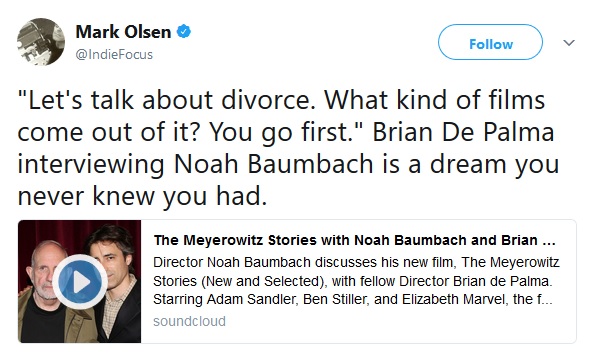
 Hello and welcome to the unofficial Brian De Palma website. Here is the latest news: |
|---|
E-mail
Geoffsongs@aol.com
-------------
Recent Headlines
a la Mod:
Listen to
Donaggio's full score
for Domino online
De Palma/Lehman
rapport at work
in Snakes
De Palma/Lehman
next novel is Terry
De Palma developing
Catch And Kill,
"a horror movie
based on real things
that have happened
in the news"
Supercut video
of De Palma's films
edited by Carl Rodrigue
Washington Post
review of Keesey book
-------------
Exclusive Passion
Interviews:
Brian De Palma
Karoline Herfurth
Leila Rozario
------------
------------
| « | November 2017 | » | ||||
| S | M | T | W | T | F | S |
| 1 | 2 | 3 | 4 | |||
| 5 | 6 | 7 | 8 | 9 | 10 | 11 |
| 12 | 13 | 14 | 15 | 16 | 17 | 18 |
| 19 | 20 | 21 | 22 | 23 | 24 | 25 |
| 26 | 27 | 28 | 29 | 30 | ||
De Palma interviewed
in Paris 2002
De Palma discusses
The Black Dahlia 2006

Enthusiasms...
Alfred Hitchcock
The Master Of Suspense
Sergio Leone
and the Infield
Fly Rule
The Filmmaker Who
Came In From The Cold
Jim Emerson on
Greetings & Hi, Mom!
Scarface: Make Way
For The Bad Guy
Deborah Shelton
Official Web Site
Welcome to the
Offices of Death Records
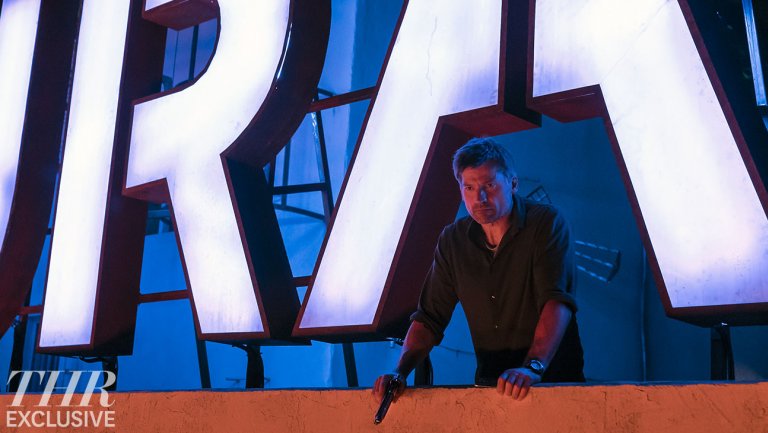
Nikolaj Coster-Waldau is on the edge in The Hollywood Reporter's exclusive first look at Domino.Carice van Houten and Guy Pearce also star in the suspense-filled crime thriller, directed by Brian De Palma.
Currently in postproduction, the fast-paced crime thriller stars Coster-Waldau as Christian, a Copenhagen police officer seeking justice for his partner's murder by a mysterious man called Imran. He teams with Alex (van Houten), a fellow cop and his late partner’s mistress, to hunt down the murderer, but are unwittingly caught in a cat-and-mouse chase with a duplicitous CIA agent who is using Imran as a pawn to trap ISIS members. Soon, they're racing against the clock to get revenge and save their own lives.
Danish scriptwriter Petter Skavlan (Kon-Tiki) wrote the screenplay. Schønne Film's Michel Schønnemann produced, with Joel Thibout, Jean Baptiste Babin and David Atlan Jackson and Peter Garde serving as executive producers. Its co-producers are Jacqueline de Goeij for Zilvermeer Productions, Els Vandevorst for N279 Entertainment, Antonio Perez for Suroeste, Leonardo Recalcati for Recalcati Multi Media and Roberto Capua for Light Industry Motion Pictures.
Global Road Entertainment (formerly known as IM Global) is selling international rights to the film at AFM.

The conversation keeps flowing from there, with De Palma comfortably asking his friend questions about how he developed as a filmmaker (Baumbach eventually says his "Vertigo moment" might have been Truffaut's Jules And Jim). At one point, Baumbach recalls first meeting De Palma at Paul Schrader's 50th birthday party, and offering De Palma a part as a therapist in his new (at that time) movie. "And you said no," Baumbach recalls, "but you said, 'Don't worry, I turn everybody down. I turned Woody Allen down.' So I felt in good company."
That's all in the first 13 minutes-- listen to the full 39-minute podcast for much more.

Yet the De Palma sequence also differs from Carnimeo's sequence in many ways. De Palma has added the Hitchcock touch of Liz witnessing the killer and then herself holding the bloody weapon, making her an immediate suspect. And he has mixed in several other elements: the meeting of the eyes between victim and witness, as one exits the film's narrative and the other takes it over; the deliberate echoes of Hitchcock's Psycho shower scene; the intercutting of Liz's conversation with her client and the horrible murder taking place in the elevator cabin while they wait (creating a dark comic irony); the entire movie leading up to Dickinson's Kate Miller getting on the elevator, feeling guilty about her one-night-stand, realizing she has left her wedding ring upstairs in the stranger's apartment, and being stared at by a young girl who seems to sense the woman's guilt.
In the earlier giallo, the victim is someone the viewer has never met before. In De Palma's film, the viewer has already become very intimately involved with the woman before she ever steps into that fateful elevator.
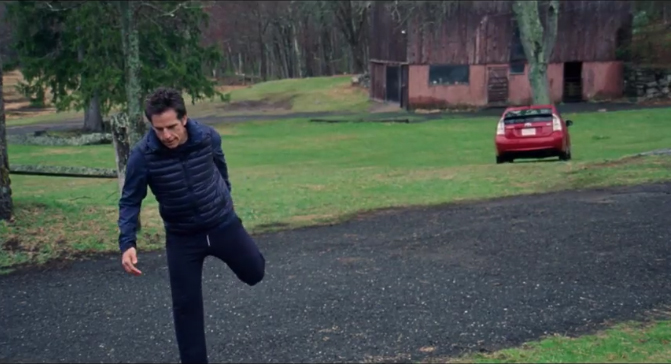
You released a Brian De Palma documentary last year, and spent a few years before that revisiting his films. Did that influence Meyerowitz in any way?Noah Baumbach: Somebody said to me the other the day that they saw Brian’s influence in the movie. I thought that was interesting. It’s not something I thought of consciously, but there are a lot of long camera moves and stuff I’ve done before, but I felt maybe I and Robbie Ryan, who shot it with me, were more successful at doing some things I’ve been trying to figure out. Brian obviously is known, rightfully so, for his great long pans.
And that thing which Brian says: you can’t play chess without showing the chessboard first.
Noah Baumbach: Right, right. Yeah, his whole thing of suspense is contingent on you understanding the space to know what’s really at stake. So often, people rush to the suspense without setting it up. Brian loves to set up a room and show you everything.
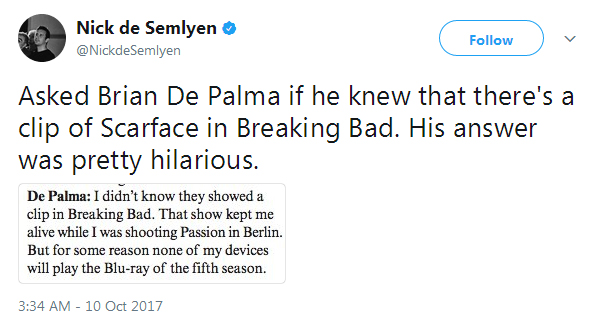
EMPIRE MAGAZINE, SEPTEMBER 2013, 'RAISING CAIN' RECUT
Nick De Semlyen has a great little sidebar interview with De Palma in the September 2013 issue of EMPIRE magazine. De Semlyen asks De Palma what we would find in his browser history cache. "They're doing live trials online now," De Palma replies, "so I've been watching the Zimmerman trial. I'm not really a YouTube guy, though I did see somebody re-edited Raising Cain into the original order in which I cut it. I looked at it and said, 'I should have left it that way.'"
'DEXTER', 'MAD MEN', 'WAR AND PEACE'
Asked if he watches any TV shows, De Palma replies, "I watched Dexter in the beginning and was fascinated by it. But when they extend these shows for six or seven years, they sort of run out of ideas, so I didn't watch the whole John Lithgow series. Even Mad Men is getting a little tired now. These things are ten times longer than War And Peace.
'HITCHCOCK'
De Semlyen then asks De Palma if he saw Hitchcock. "Yes," De Palma replies. "I bought the book to see if it was actually real, what happened. I don't remember Hitchcock having problems with his marriage during the making of Psycho. So I thought it was interesting, but is it true?"
'THE DEMOLISHED MAN'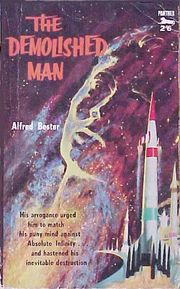 When asked about Ridley Scott's Prometheus, De Palma tells De Semlyen, "I didn't think it was as good as the original. It's not like Godfather I and II. There's a science fiction story that I've always felt would make a terrific movie: an Alfred Bester book called The Demolished Man. It's about a society of Espers, who can read people's minds. And then a great economic titan figures out how to kill his wife and not get caught. The rights are all tied up at Paramount."
When asked about Ridley Scott's Prometheus, De Palma tells De Semlyen, "I didn't think it was as good as the original. It's not like Godfather I and II. There's a science fiction story that I've always felt would make a terrific movie: an Alfred Bester book called The Demolished Man. It's about a society of Espers, who can read people's minds. And then a great economic titan figures out how to kill his wife and not get caught. The rights are all tied up at Paramount."
JASON STATHAM FAN
De Semlyen concludes by asking De Palma if he's a fan of Jason Statham, who he was going to direct in the remake of Heat. "Oh yes," replies De Palma. "I've always wanted to make a film with him. I've seen both Cranks and loved them. In fact, I don't think there's a Jason Statham film I haven't seen. He's been doing too much action stuff, driving cars and beating up people. He needs a more Steve McQueen-type part. But it didn't work out."
The same issue also includes a positive review of Passion by Ian Nathan, who says that during its second half, "Passion is transformed into a butterfly of hyperactive noir."
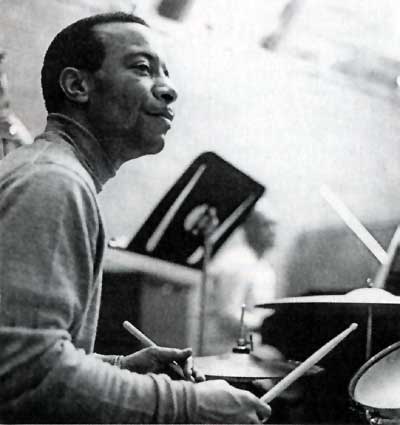 Grady Tate, the drummer who played the infectious groove and sang lead vocals on the song Be Black Baby, died Sunday night "at his home in the Upper East Side neighborhood of Manhattan," according to NPR's Nate Chinen. He was 85.
Grady Tate, the drummer who played the infectious groove and sang lead vocals on the song Be Black Baby, died Sunday night "at his home in the Upper East Side neighborhood of Manhattan," according to NPR's Nate Chinen. He was 85.Here's more from Chinen's informative Tate obit:
The precision and ebullient feeling in Tate's drumming made him a first call, in the studio and on tour, for many of the finest singers of the '60s and '70s, including Ella Fitzgerald, Tony Bennett, Lena Horne and Peggy Lee. He also had credits on some notable pop albums, like Roberta Flack's Killing Me Softly and Paul Simon's There Goes Rhymin' Simon. He was the drummer for Simon & Garfunkel's famed 1981 reunion concert in Central Park, which sold millions of copies when it was released as an album the following year.A generation of kids grew up hearing Tate's voice on the soundtrack for Schoolhouse Rock!, the series of educational cartoons broadcast on Saturday mornings by ABC. The songs were largely composed by Bob Dorough, who sang more than a few of them himself. But Tate was featured on some choice selections, including "I Got Six" from 1973, "Fireworks" and, in a vocal performance as soulful as it is numerically instructive, "Naughty Number Nine."
Tate's career as a vocalist was much more than a side hustle, though, stretching back to 1968 and his debut album, Windmills of My Mind. The title track — a cover of the theme from The Thomas Crown Affair, which won the Oscar for best original song that year — presents Tate the singer in full bloom. He's a suave, companionable stylist, with unlabored phrasing and a careful attunement to lyric and mood.
(In fact, both of Tate's Grammy nominations were for vocal performances: Multiplication Rock was up for Best Recording For Children in 1973, and his version of "She's Out of My Life," from the Jimmy Smith album Go For Whatcha Know, vied for Best Jazz Vocal Performance, Male, in 1986.)
Though he had the voice of a jazz balladeer, Tate muscled easily into soul and R&B. "Be Black Baby," released as a 7-inch single on the Skye label, is a funky exhortation that can now be found on the compilation Black & Proud Vol. 1 - The Soul Of The Black Panther Era. The song was also sampled on tracks by Big Daddy Kane and the Beastie Boys, and turned up in the 1970 cult film Hi, Mom! — an early Robert De Niro vehicle, directed by Brian De Palma.
Grady Tate was born in Durham, North Carolina on January 14, 1932, and began singing in church at age 4. Not long afterward, he began playing drums; he was entirely self-taught.
After graduating from high school, Tate served four years in the Air Force, playing in a show band whose resident arranger was the trumpeter Bill Berry. He returned to Durham to study theater arts, literature and psychology at North Carolina College. Then he moved to Washington, D.C., where he worked briefly as a postal carrier before joining the organist Wild Bill Davis on the road.
Tate moved to New York in his late 20s, but not in pursuit of a musical career: he enrolled at the American Academy of Dramatic Arts to study drama. His training as an actor was curtailed after saxophonist and flutist Jerome Richardson recommended him to Quincy Jones, who had just lost his drummer. The association with Jones led in turn to session work and a six-year stint with Doc Severinsen's Tonight Show Band on NBC, from 1968 to '74.
For a certain pop-culture fan base, Tate will always be legendary for his cool, undulant drumming on the soundtrack to David Lynch's show Twin Peaks. Angelo Badalamenti, the composer, recently relayed Tate's joke that the score only ever inhabited two tempos: "slow, and reverse." But in addition to his delicate brushwork on the original Twin Peaks series, Tate is featured in the soundtrack to Twin Peaks: The Return, which aired this year.
One track, named in his honor, amounts to nearly two minutes of drumming in the foreground, in snappy waltz time. The track, "Grady Groove," captures the inherent musicality in Tate's beat, a gift both rare and so natural that it can still be easy to overlook.
Survivors include Tate's wife, Vivian, and a son, Grady Tate, Jr.
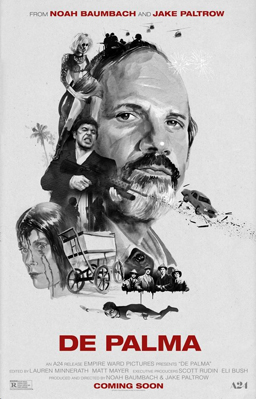 Noah Baumbach has been out promoting his new Netflix film, The Meyerowitz Stories (New and Selected). A couple of interviewers have asked him about his influences, and specifically about Brian De Palma. Meanwhile, Jared Leto, while promoting Blade Runner 2049, also talked about some of his cinematic inspirations...
Noah Baumbach has been out promoting his new Netflix film, The Meyerowitz Stories (New and Selected). A couple of interviewers have asked him about his influences, and specifically about Brian De Palma. Meanwhile, Jared Leto, while promoting Blade Runner 2049, also talked about some of his cinematic inspirations...Noah Baumbach has been making movies for more than 20 years, and in that time, has developed a distinctive voice in American cinema. His stories of neurotic New Yorkers are loaded with memorable moments of self-obsession and narcissistic showdowns. But Baumbach didn’t become a filmmaker overnight; he learned much about filmmaking from watching other movies. Raised by novelist Jonathan Baumbach and film critic Georgia Brown, Baumbach grew up surrounded by cinema, and it played a critical role in his evolving love for the medium.The filmmaker looked back on some of these key influences during a conversation at the Film Society of Lincoln Center shortly before a screening of his latest effort, the ensemble comedy “The Meyerowitz Stories (New and Selected),” which Netflix releases later this month.
The Movie Brats
Baumbach was born in 1969, which placed on the younger end of the spectrum of moviegoers influenced by the movie brat generation — the collection of mainstream filmmakers who produced iconic studio movies at a transitional moment in Hollywood history. “I’m the age of ‘Star Wars,’ and everybody’s the age of ‘Star Wars,’ but I was actually seven when it came out and grew up with it,” Baumbach said. “At that age, I wanted to make all kinds of movies.” He was also a big Steven Spielberg fan. “I could see all these movies — not ‘Jaws,’ I [wasn’t allowed] to see that — but all the others. They were so meaningful to me… ‘E.T.’ was my favorite film.”
Baumbach’s cinephilia blossomed in the late eighties and early nineties. That’s when he first discovered another ‘70s-era breakout, Martin Scorsese. “Like everybody, you’re seeing the luck of the draw,” he said. “It’s like, who’s your James Bond? What was your first Scorsese? I saw ‘King of Comedy,’ then ‘After Hours’ and ‘The Color of Money.’ Those were my Scorseses. Of course, then I went back and saw the others.”
These days, Baumbach’s favorite filmmaker from that generation may be Brian De Palma, the subject of the documentary “De Palma,” which Baumbach co-directed last year. “I’m friends with Brian, but I couldn’t see those movies at that age,” Baumbach said, referring to his childhood. “I couldn’t go to ‘Dressed to Kill’ or ‘Blow Out.’ Those I caught later. The first Brian movie I saw was ‘Wise Guys,’ which was a strange one, a comedy.” However, De Palma’s meta gangster drama “The Untouchables” hit theaters in 1987, a sweet spot for the young Baumbach. “I was lucky that he made that one right when I could see it,” Baumbach said. “Even though my parents would tell it was ‘lesser Brian,’ I was like, not in my mind. It was great.”
It’s a little jarring to think that Noah Baumbach has been directing movies now for 22 years. In some ways, he still seems like that fresh-faced kid who released Kicking and Screaming when he was only 26. Somehow, behind a curtain somewhere, Baumbach became a full-fledged “veteran director.” (To put this in perspective, Baumbach’s at the same stage of his career that Scorsese was when he was making Goodfellas and Cape Fear.) Baumbach, like contemporaries such as frequent collaborator Wes Anderson, have now been doing this a long time. They are no longer the new wave of directors, they are just “the wave.” And now, Baumbach may just have made his best movie.And that’s not a claim made lightly. Baumbach’s filmography includes Greenberg, The Squid and the Whale, Frances Ha, Margot at the Wedding – and one of the best documentaries ever made about a filmmaker, De Palma (co-directed with Jake Paltrow). But with The Meyerowitz Stories (New and Selected), he’s arguably made his deepest and most complete film.
Dustin Hoffman plays Harold Meyerowitz, the father of Danny and Jean (Adam Sandler and Elizabeth Marvel), and their half-brother, Matthew (Ben Stiller). Their stories are divided in half, which builds anticipation because we have two of the biggest mainstream comedy stars of the last 20 years finally in a movie together, yet for a good portion of the film, they don’t share any scenes. Of course, Baumbach knows exactly what he’s doing. When the characters finally come together for the final act it’s truly powerful.
Baumbach does not like doing short interviews. So we had plenty of time to take a deeper dive into what he was trying to accomplish with The Meyerowitz Stories. And Baumbach can get a little skittish when talking about his movies and himself – like any normal person would – but it’s pretty obvious even Baumbach knows this movie is special.
The Meyerowitz Stories is currently playing at the New York Film Festival, as well as his partner’s film, Greta Gerwig’s Lady Bird, a movie that is also getting rave reviews. This is the first time the pair has had competing films (after collaborating many times) and as Baumbach admits, yes, it’s weird. Ahead, Baumbach also discusses who else he’d have loved to have made a filmmaking documentary about in the same style of De Palma. (It’s a legitimate “what could have been” reveal)...
...When it comes to a documentary based on a filmmaker, I’ve heard the phrase, “Well, it’s no De Palma,” used a few times. That’s got to be a nice feeling that you’ve made a documentary based on a filmmaker that’s so well received.
Well, it’s nice to hear. I love it. That’s a project that I can un-complicatedly talk about because I feel both proud of what we did with it, but also, obviously, it’s a celebration of Brian. Brian’s work speaks for itself. We didn’t create an advertisement for Brian, which some of these very entertaining documentaries sometimes feel like. You know, they’re there to remind you how important this person was. And I felt like, whether you know Brian or not, that would be clear by watching the movie. But also that wasn’t what we were setting out to do. But I loved working on it because it just meant picking cool Brian De Palma clips to go with what he’s saying – it’s a pretty good day at work.
Could you do something like that with someone else?
Well, yeah. I mean, it’s obviously singular to Brian. I think, yeah, there are people I wish I had actually done it with, people who I got to know who passed away who I loved talking to and talking about movies. Jake Paltrow and I and Brian are just very close, close friends. And the thing really is a document of our dinners, our hanging out, our asking him about what happened on this movie and what happened on this movie. I mean, we did it obviously in a more formalized way for the documentary, but it’s all stuff we talk about and talked about anyway.
So that’s obviously an important ingredient in why that feels so personal, in a way. I know from my own experience, and I know it from other people who I know who are well known and do interviews or whatever, it’s just, no offense, but you can’t kind of enter into the same kind of ease that you can with a friend – and a friend who does exactly the same thing as you. So that was really part of what makes that. I mean, you look at other great documents like Peter Bogdanovich’s interviews with directors…
Who you got to work with a couple years ago.
Yes, well, I’ve known Peter for a long, long time. And those are unbeatable, too, because they’re just so much about filmmaking. You have them answering the questions and talking about the things that are, I think, really about filmmaking. And that’s always, for me, the stuff that I’m most interested in reading or watching.
Who do you wish you would have gotten a chance to do a documentary with?
Mike Nichols. Bob Altman. I got to know them pretty well, and I think they both would have made – and very much in their own ways – you could have done an interesting, great version of what we did with Brian.
“For me, when I was a kid, it was Blade Runner, it was Tron, it was The Shining,” Leto told Rotten Tomatoes. “It was these kind of elevated genre movies really blew my mind, as well as films like Clockwork Orange and Scorsese [movies] and the early work of Brian De Palma. But Tron is another one that I feel like is a world that we’re not done with yet. There’s so much more to explore and to see there. I would absolutely love to expand upon the world of Tron and see what we could do to bring that to life.”
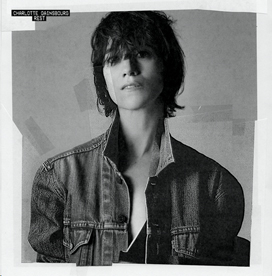 Charlotte Gainsbourg's upcoming album, Rest, will be released November 17th. According to Under The Radar's Christopher Roberts, while the title track was produced by Daft Punk's Guy-Manuel de Homem-Christo, the rest of the album was produced by SebastiAn. Roberts writes, "A press release says Gainsbourg and SebastiAn were inspired by the music of Giorgio Moroder, as well as various movie soundtracks, 'particularly Pino Donaggio's score for Brian De Palma's '70s horror classic Carrie, Georges Delerue's music for Jean-Luc Godard's nouvelle vague masterpiece Le Mépris, as well as the unsettling ambience of films like Stanley Kubrick's The Shining and Hitchcock's Rebecca.'"
Charlotte Gainsbourg's upcoming album, Rest, will be released November 17th. According to Under The Radar's Christopher Roberts, while the title track was produced by Daft Punk's Guy-Manuel de Homem-Christo, the rest of the album was produced by SebastiAn. Roberts writes, "A press release says Gainsbourg and SebastiAn were inspired by the music of Giorgio Moroder, as well as various movie soundtracks, 'particularly Pino Donaggio's score for Brian De Palma's '70s horror classic Carrie, Georges Delerue's music for Jean-Luc Godard's nouvelle vague masterpiece Le Mépris, as well as the unsettling ambience of films like Stanley Kubrick's The Shining and Hitchcock's Rebecca.'"